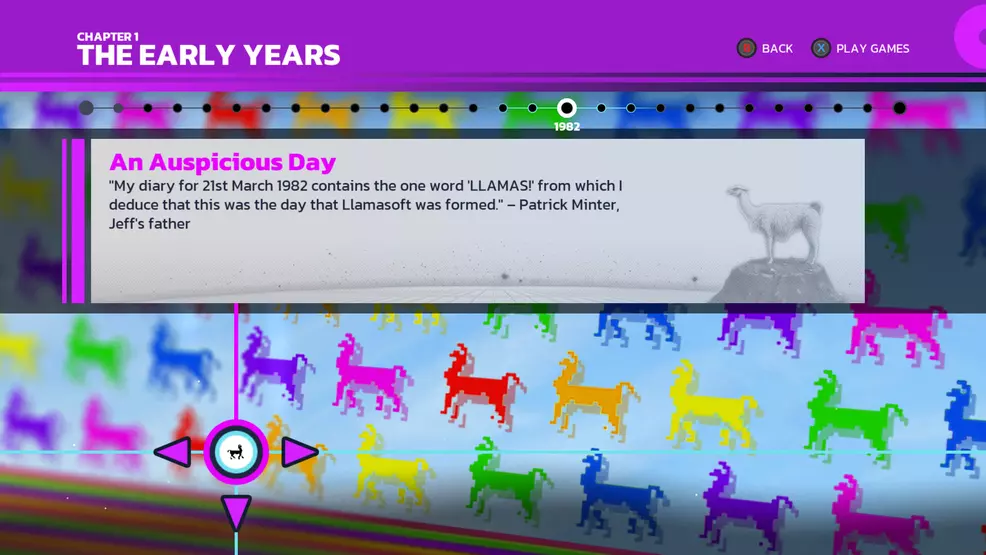My first degree is in history. My second is in journalism. Career advisors, professors, and pretty much everyone I spoke with during college and grad school emphasized just how much crossover there is between the two disciplines and how they tell stories.
That's true, to an extent, but Llamasoft: The Jeff Minter Story, the latest in Digital Eclipse’s Gold Masters documentary series, reminded me how very different the two worlds are, despite sharing almost identical skillsets. There’s enough material here for a roughly 1,500-word piece that gives a broad overview of Llamasoft’s story here. A full documentary of historical significance to the games industry, however, this is not.
Tell me a story (please)

The biggest surprise from both historical and journalistic perspectives is that The Jeff Minter Story isn’t really a story. The project’s four chapters present a vague, loose timeline of events from the time Minter started making games in the 1970s until Llamasoft’s troubles in the 1990s. Each chapter has multiple points on its timeline with a few sentences of description and one or two videos with interviews from people who worked with Minter or who knew him.
There’s also a handful of informative asides, some relevant to the chapter in question, some seemingly chosen at random – a place where Minter lived, for example, or questions about influences on Minter that, surely, the people writing his story could’ve simply asked about since the documentary’s subject is still living.
Digital Eclipse’s selection of artifacts also feels haphazard, as if they were chosen at random simply to have something tangentially relevant to the period in question. An early example whose purpose I still can’t fathom is a handful of Minter’s notes with calculations and scribblings. The caption tells us it’s a set of notes with calculations and scribblings. There’s no transcription, so good luck reading Minter’s loose, rather messy scrawl, and no apparent reason for the item's inclusion.

I don’t expect museums to provide visitors a rationale for why every piece is included, but well-curated collections tell their own story without someone having to spell it out for you. The Jeff Minter story is not such a collection, and it's hard not to think it needed a much heavier hand guiding curation and editing.
That said, the selection of artifacts included – from images and personal effects to artfully edited footage – is impressive, and the precious few video segments of the documentary use them well. The presentation and interface are also high points. Digital Eclipse makes elegant use of retro aesthetics and sounds without straying into shlocky territory, and the result is a stylish, laid-back package that invites you to casually scroll through the exhibits at your pace.
And you know the rest

Less effective are most of the project’s interviews. Most of the sources used in the piece repeat sentiments that are largely the same. There’s little benefit in hearing six people say they thought Minter was a hippie who played by his own rules when you’re not tying this information back to his life and work, and even less when that knowledge remains isolated. The project makes no attempt at expanding on the historical or cultural landscape that shaped Minter and his work, and it often assumes you know the details already, such as why Mama Llama was “controversial” and why it’s even worth mentioning. If you’re that familiar with the nascent games industry of the 1970s and 1980s, then you probably know about Llamasoft already, rendering Digital Eclipse’s game unnecessary to begin with.
Another missed opportunity that seems impossible to ignore is how Digital Eclipse integrates Llamasoft games – or, more accurately, does almost nothing to integrate them. At all. Each game included in the collection pops up in the timeline with a brief description and a prompt to examine or play it, and that’s it. How does it fit into Minter’s work and life at the time? Why is it important? What does it actually tell us about Jeff Minter’s story? Even the dedicated library where every included Llamasoft game lives has nothing other than a barebones description and a complexity rating.
Fill in the blanks, is apparently what Digital Eclipse wants us to do. And maybe we could, if there were enough information to fill it the many empty spaces with. I walked away with no clear idea of what Minter contributed to the games industry and why it’s worth trying to make a documentary about him.
As a hub for video game preservation, Digital Eclipse's latest is fine. It does the absolute minimum and not a bit more. As a piece of history, though, it’s baffling, incomplete, and rushed. I can’t help but think that perhaps the Jeff Minter story that Digital Eclipse wanted to tell proved too unwieldy and maybe too expensive to fit into this release, and what we end up with is this pared down version. Even that doesn't explain the lack of effort to actually tell a story and put any of Minter's life and work in worthwhile context.
The publisher provided the PC copy of Llamasoft: The Jeff Minter Story used for this review. Llamasoft is available now on PS5, PS4, Xbox, and PC.
Llamasoft: The Jeff Minter Story
- Stylish interface
- Important for games preservation
- No coherent through-line or purpose
- Lack of context
- No attempt to explain Minter's significance or even how he contributed to the industry
- Haphazard selection of artifacts with, seemingly, no curation
- Assumes you already know the industry's and Minter's histories
-
Josh Broadwell posted a new article, Llamasoft: The Jeff Minter Story review: A little better than Wikipedia
-
Solid review! I've been a big fan of Atari 50 and The Making of Karateka. I haven't played this yet, but I do feel many of the interviews and content in ''Karateka'' especially aren't historically interesting. It's nearly impossible to pick out "video game firsts" when games have been in development for months and many critics and historians just make assumptions based on what would appear to be the truth, which isn't always the case. Like, in The Making of Karateka, there is some interviews with John Tobias of Mortal Kombat fame. You'd think he'd have something interesting to say about Karateka, mostly a nostalgia trip of him remembering playing it at the time, and not if he applied anything to what he saw in Mortal Kombat.
I still think his input is valuable though, as even these video game vets do show what it probably felt like at the time to approach these games. This is probably shallow from what you'd want from deep documentary content, but this is still leagues above most video game retrospectives. If I could do anything to improve on this, it would bring in someone like Frank Cifaldi or someone who is a specific expert in the historical context of these kinds of games to give a bigger context in some interview format. It's great to have big names show up to get nerds hyped, but you have to really give someone who actually invests time in the history, instead of vague memories of games they haven't played or maybe even thought about in 30 years. -
I have to say, I was happy to see a review so focussed on critiquing this purely as a piece of documentary work rather than a games anthology (having a variety of perspectives and approaches is what makes reviews interesting in the first place), and was disappointed to hear that it was so lacking in that regard.
But, having gotten the collection anyway, I was surprised to see some of the issues mentioned don't seem to be accurate — while there could be some more editorial (and I agree that it would be nice to see industry bods talk about how Minter has been an influence on them), the documentary content is extensive. To take a specific example from the review, the Mama Llama drama is described as not being explained or contextualised, but there's not only a video about the Mama Llama drama itself that interviews both parties, there's a scan of the review in question from Zzap, a scan from his newsletter expressing his displeasure, and scans of a later interview in Zzap (which was quite a decent follow up piece.) All the context is there! I'm wondering if Josh maybe missed that you can drill down (as in, literally scroll down to different notes and videos) into each branch of the timeline?
In a way I'm glad for this review, as it left me very positively surprised by the documentary side of this release, but I do feel like something has been missed!
-


